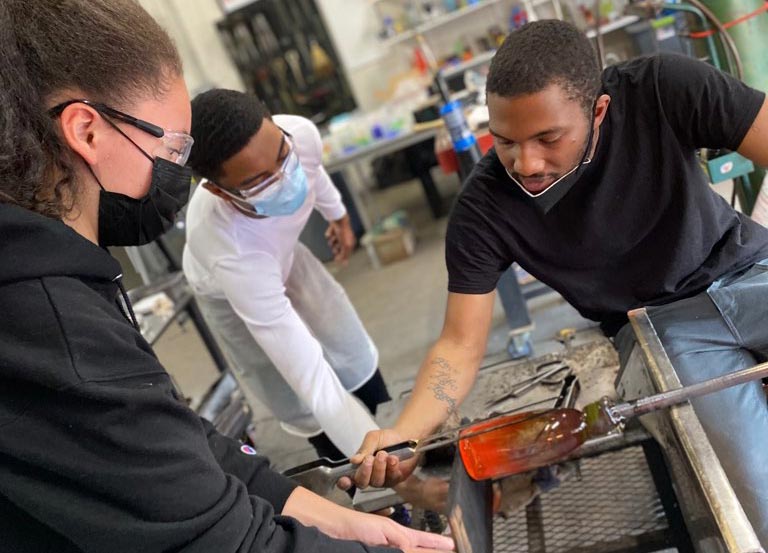Showing Our Work

Firebird Community Arts Language Gospel
Introduction
"When we talk about being asset-based we mean eliminating the practice of defining less-protected communities as a culmination of deficits or traumas. Asset-based means first recognizing that all communities, including those often labeled as “marginalized” or “disenfranchised,” are filled with knowledge, skills, ideas, and solutions that if respected and supported, can scale up in ways that advance sustainability, impact, and self-determination."
— Effective Change Requires Proximate Leaders, Stanford Social Innovation Review
We choose to re-examine the language we use and build a practice of continually challenging harmful narratives that diminish people’s humanity and also prevent us from meaningfully changing actual causes of problems like violence. We are engaged in this work, because we recognize that language contains bias and that bias, when repeated, unexamined, and unchallenged, reinforces harmful narratives that blame individuals and hide the deeper root causes of barriers like poverty and actions like gun violence.
What we’re trying to do
- Communicate clearly, without jargon
- Replace harmful narratives created by systems of oppression
- Name and acknowledge effects of systems of oppression
- Assert strengths, assets, and possibilities of young BIPOC
- Avoid microaggressions
- Be transparent and invite others to join us as learners/always growing. We’re all human and won’t be perfect; it’s about our best intentions, exhibiting empathy and confronting harmful systems and structures
- Describe people’s situation, rather than people. Barriers are separated from people.
Our (non-exhaustive) statements
- Everyone should have access to an artistic home. Firebird prioritizes serving youth of color and those who have faced structural barriers to art spaces.
- Most professional glass and clay art studios have long been Predominantly White and Wealthy Institutions (PWIs). Firebird acts to redress this inequity, co-creating an arts community centering Black and brown artists and youth.
- Firebird is a safe place that embraces the abundance of creativity and care within young people, instructors, and guests. Working together with molten glass and fire based artforms requires total focus and team efforts to keep each other safe. When people feel safe, we can slow down, escape from stress, exchange ideas and information, observe and learn from each other at various stages of our personal journeys.
- Creating art in a studio, young artists develop expertise and build life experience and professionalism. Embracing the assets, talents, and creativity of young people allows us all to imagine and build our own futures and reject limiting stereotypes.
- Firebird is a space to heal and experience growth in oneself and one’s community in a way that gets us unstuck, shows new possibilities and shares positivity.
- In addition to learning art skills such as clay and glassblowing, Firebird provides opportunities including paid work, professional development, travel, and entrepreneurship in order to help prepare young people for their own chosen futures.
Words not to use
- Victims
- At-risk
- Marginalized
- Inner-city or “urban”
- Rescue or hero narratives
- Arts-desert
- Turn their lives around
- Deprived
- Lacking
- Any word you wouldn’t like to hear about your own child or loved one
- Poor/low-income
Glossary
- Social capital
- Equity vs. equality
- PWIs (predominantly white and wealthy institutions)
- Hero narrative
- Vulnerable
- BIPOC
- Structural barriers
Naming of systems/structures
- Root causes of violence are not individual or neighborhood attributes.
- Racism and sexism always has and continues to show up in public policy and private institutions- redlining, restrictive covenants, stop and frisk, violence and discrimination by police keeping people isolated.
- Investments are inequitable- Heavy investments in police/incarceration combined with low investment in free public spaces (libraries, parks, and schools with public fieldhouses, sports facilities, and programs, businesses like bookstores) centers, gathering places, sources of food, meals, entertainment.
Methods for dissemination
- Panel at an upcoming event
- Social media
- Guidance for board: presentation and these guidelines
Resources:
- Asset Framing: The Other Side of the Story
- Can Art Bring Justice to Black Homeowners?
- The Power of Asset Framing: A Conversation with Trabian Shorters
- NYT on “Thinking, Fast and Slow”
- Effective Change Requires Proximate Leaders
- Beyond Heroes: A Guide for the Media
- Chicago Beyond 2019 Guidebook
- Asset-Based Framing Workshop
- The Micropedia
- 13th - naming systems